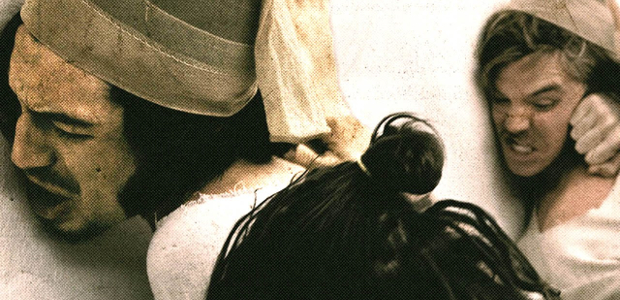In 1971, Dr Phillip Zimbardo conducted an experiment so shocking, it ended after six days. The mission of this experiment was to test the limits of human behavior, as well as observe any changes to said behavior while inhabiting the role of prisoner or guard. Much like its historical namesake, The Stanford Prison Experiment tries to test the boundaries of historical filmmaking, and while it starts out well it ends a lot worse for the wear than it began.
Under the care of Dr. Zimbardo (Billy Crudup) 24 young male students are randomly assigned the roles of prisoners or guards. Over the course of a prescribed 2 weeks, the students would fulfill their roles to the best of their abilities and discard the notion that the experience was an experiment. What happened in the course of six days was something so unbelievable, that even Zimbardo himself would be surprised how far things got.
I really wanted to like The Stanford Prison Experiment, and a good portion of the beginning of the film, I actually did. The cast assembled, headed by Crudup but including such young talent as Tye Sheridan, Johnny Simmons, and Olivia Thirlby, is a solid one that gives excellent performances. Everyone brings their A-game, and at moments this film brings a legendary piece of psychology history to life in a way that I never would have thought possible. Had this film progressed in the same manner it had for the first two acts, I might have been able to positively recommend this latest directorial from Kyle Patrick Alvarez.
Unfortunately, the downside to The Stanford Prison Experiment is that its pacing grinds to a dead halt when the film starts to repeat itself. While it's true the experiment progressed in such a manner that it didn't change all that much as time went on, that doesn't mean the filmmakers had to present it in such a manner. What starts out as a fresh movie ultimately wears the viewer down, and not in the raw, emotional way that those involved would have hoped for. By time the film ends, it feels as if it's spent too much time on the experiment aspect, and not enough on the before or after effects of the traumatic experience had by all. If the film had focused on the initial group of prisoners, or even just one, to give the film a stable frame of reference, that could have worked. Instead, the film takes an “outside looking in” approach, and ultimately feels like it loses its narrative once prisoners start being replaced.
While this film might win over folks with its no frills presentation, and its exemplary cast, The Stanford Prison Experiment is a film that ultimately feels too much like a textbook and too little like a film. The source material is rich enough that the experiment could be made into a compelling film, and the funny part is this isn't even the first film to cover this subject matter – though it does look to be the first historically based adaptation of the events of the 1971 experiment. Here's hoping the results of this film don't scare off any future filmmakers from trying to tackle this story again, as there's still a good film waiting to be made out of this story.
Your Daily Blend of Entertainment News

Mike Reyes is the Senior Movie Contributor at CinemaBlend, though that title’s more of a guideline really. Passionate about entertainment since grade school, the movies have always held a special place in his life, which explains his current occupation. Mike graduated from Drew University with a Bachelor’s Degree in Political Science, but swore off of running for public office a long time ago. Mike's expertise ranges from James Bond to everything Alita, making for a brilliantly eclectic resume. He fights for the user.

